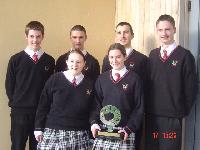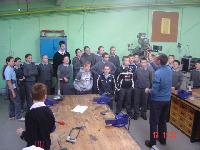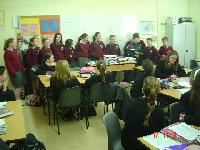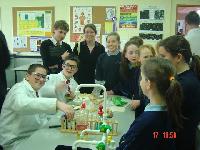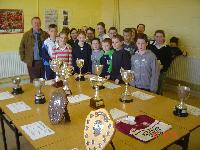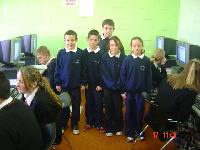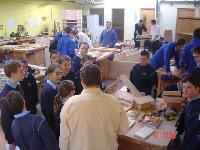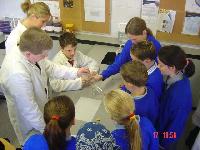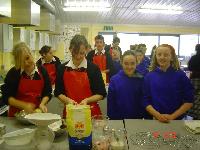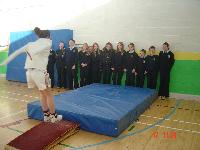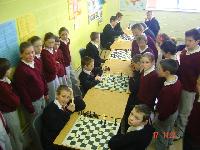On Monday 27th Leaving Certificate 2 class will be doing a road safety course details to follow
Category: News
Limerick District Court
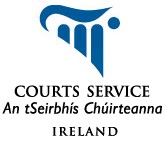
On 24th November a Third Year Group will travel to Limerick District Court as Part of their CSPE Program
Information for CSPE students on Courts Services
About the courts
What the courts do
Every country has a courts system, some of which are very different to our system. But they all have the same aim: to see that justice is done.
In Ireland there are two types of court case: civil actions and criminal prosecutions. It is the court’s job to make sure that the outcome of every case is fair and reasonable.
Where people disagree about any matter of fact or point of law which affects their legal rights the problem can be resolved in what is called a civil action. Civil actions are taken by individuals against other individuals or organisations. The State generally has no part to play in such cases. These kins of cases include personal injury claims as a result of road traffic accidents, breach of contract actions and disputes over rights of way or planning permission.The purpose of a civil claim is most often to seek compensation or to recover money owed.
Criminal prosecutions on the other hand, are prosecuted by the State, usually through the Director of Public Prosecutions. They generally deal with things considered wrong or illegal, such as murder, rape, theft and robbery. The aim of the criminal law is to punish, usually through a jail sentence or a fine.
Many cases, such as personal injury actions or minor traffic offences, are decided by a judge sitting on his own, without a jury. However, all serious criminal offences (and some civil cases, such as libel and defamation) are tried by a judge and jury. In these cases, the judge will guide the jury on legal matters while the jury must decide the facts and return their verdict.
What the different courts do
In Ireland, there are four distinct types of court: District Court, Circuit Court, High Court and Supreme Court. Each court deals with specific types of cases.
The District Court
The District Court is organised on a regional basis throughout Ireland. It deals with civil actions where the compensation claimed is not more than €6,350. It also deals with liquor licensing cases and a wide range of family law cases including custody and maintenance of children and applications for barring orders. The District Court also deals with criminal matters such as drunk driving, speeding, assault, criminal damage and the initial hearings of serious criminal offences to be tried in the higher courts. A judge sitting alone deals with these cases. Consumers can avail of a procedure in the District Court called the Small Claims procedure to recover sums up to the value of €2,000.
The Children Court
The District Court can try a child or a young person for any offence except homicide provided that in certain cases the child’s parent or the young person has been told of their right to trial by jury and has consented to be dealt with by the District Court. In Cork, Limerick and Waterford the Children Court of the District Court deals with charges against children under 16 years of age except where the charges are very serious or where the judge thinks there are special circumstances. The Children Court is held in the courtrooms where the ordinary sittings of the District Court are held. In Dublin there is a separate Children Court which sits every working day. At other venues charges against children are heard in a different building or room to the ordinary sittings or on different days or times and the court is called a Juvenile Court.
Drug Treatment Court
The Drug Treatment Court is a specialised court in Dublin city that aims to treat, rather than imprison, drug addicts. This Court deals with non violent offenders whose offending behaviour is motivated by their addiction rather than for financial gain. The aim of the programme is to provide long term court supervised treatment for offenders who are involved in drug abuse. The central principle is that by dealing with the reason for the offending that is, the addiction, the need to offend is removed.
Dublin North Inner City was chosen as the target area for the pilot stage of the project. This decision was influenced by the greater availability of treatment programmes in that area than in the rest of the Eastern Health Board region. In 2003 it was decided to extend the pilot scheme for a further period of time and the target area was expanded to include Dublin 7. In 2006 it was decided to extend the Drug Treatment Court to the city of Dublin.
The Circuit Court
The Circuit Court is organised on a regional basis. It deals with civil cases which do not exceed €38,000. It can also deal with some liquor licensing cases and a wide range of family law cases including divorce and judicial separation. In criminal matters, the Circuit Court sits with a judge and jury and can deal with all except the most serious offences such as murder and rape. The Circuit Court also hears appeals from the District Court in civil and criminal matters.
The Special Criminal Court
The Special Criminal Court consists of three judges sitting without a jury and mostly deals with criminal charges involving terrorist organisations, and more recently, charges relating to organised drug activities. The court was established by the Government to hear cases that the ordinary courts might be unable to deal with, because of fears of the possibility of jury intimidation.
Central Criminal Court
When the High Court is dealing with criminal cases, it is known as the Central Criminal Court. It tries the most serious criminal offences, such as murder and rape, which the Circuit Court cannot deal with. A judge and jury try these cases. Until recently the Court sat only in Dublin. In recent times the Court has travelled to a number of other venues including Cork, Limerick, Sligo, Waterford and Castlebar.
The High Court
The High Court is based in Dublin and has the power to hear all criminal and civil matters (including family law cases) but usually hears only those cases that cannot be dealt with by the lower courts. This means that in civil actions it hears cases where the claim exceeds €38,000. It also hears appeals from the Circuit Court in civil matters.
The Court of Criminal Appeal
The Court of Criminal Appeal hears certain appeals relating to a criminal conviction or sentence from the Circuit Court, Central Criminal Court or the Special Criminal Court.
The Supreme Court
The Supreme Court is the highest court in Ireland and hears appeals from the High Court and occasionally from the Court of Criminal Appeal. Under article 26 of the Irish Constitution, the President of Ireland may refer any Bill passed by the Oireachtas to the Supreme Court to decide whether it is unconstitutional. The Supreme Court can also give rulings on questions of law raised in the Circuit Court.
How can you become involved in the court process
You are most likely to come into contact with the courts either because you have taken an action yourself, such as a personal injury claim or because you have been directed to attend in court, for example, as a witness or a juror.
If one person brings a case against another person, they become an active party in a legal case and are known as a litigant, someone who takes an active part in litigation. The person bringing the claim is known as the plaintiff. The person defending the claim is known as the defendant.
In a criminal case, a person who has been injured or suffers loss as a result of a crime is usually referred to as the victim. In a criminal action, the victim is not a party to the actual proceedings since crimes are prosecuted by the State.
Sometimes an eyewitness to a road traffic accident or to a crime may be called as a witness at the trial of the case. If called, a witness must give truthful evidence under oath to any questions put to them. Giving false evidence under oath is a crime known as perjury. Expert witnesses such as engineers or doctors may also be called to give evidence within their area of expertise.
Trial by jury is one of the most basic rights in a democracy. Jury members are selected from the electoral register and if you are called to serve on a jury you must do so. Some people such as Gardaà and prison officers are exempt from jury service and others can be excused, such as doctors and full-time students. It is an offence not to appear on the date indicated in the jury summons. A jury consists of 12 people and their duty in a criminal trial is to decide whether the accused is guilty or innocent. In a civil trial, they evaluate the evidence and decide whether to find in favour of the plaintiff or the defendant. While the judge guides the jury on matters of law and summarises the evidence given in court, it is the jury that considers the facts and returns the verdict.
Leaving Certifiacte Applied 2 Drama
The Leaving Certificate Applied 2 class will take part in a Drama Workshop on Tuesday 21st and 22nd November
Top marks for Hazelwood College Science Students
Top marks for Hazelwood College Science Students
The Annual ISTA Senior Science Quiz was held on Thursday last in Limerick Institute of Technology. Teams from Hazelwood College were awarded first and third place in the regional final of the prestigious competition. The winning team was made up of Billy Fehin, Bryan O Regan and Una O Sullivan. The third placed team was David Fitzgerald, Mary Ennis and Kevin Schulte. Both teams will now travel to Trinity College on the 25th to partake in the National Finals. Best of luck to both teams.
1st Year Geography Trip
The first year geography class will travel on a geology trip on Monday 20th. More Details to follow
Open Day Photos
1D Science Trip

Class 1D will travel to the University of Limerick to see a Science Magic show as part of the National Science Week
Leaving Certificate Class of 2006
Leaving Certificate Class of 2006
We would like to congratulate all of our students who completed both the Leaving Certificate and the Leaving Certificate Applied in 2006 on their outstanding results. Results for the Leaving Certificate were 41 A’s, 17 B’s, and 113 C’s. Eight students have gone on to study Primary School Teaching in Mary Immaculate College, Limerick. Our Leaving Certificate Applied students received a high percentage of distinctions and are now all pursuing their chosen careers.
The Leaving Certificate Class have gone on to do the following careers / courses
David Aherne: Apprenticeship
Ann-Marie Browne: Hotel Management in Waterville
Elizabeth Costelloe: Beautician
Diarmuid O’ Carroll: Office Information Systems in Limerick Institute Technology (Deferred)
Michael Boyce: Primary School Teaching in Mary Immaculate
Margaret Buckley: Primary School Teaching in Mary Immaculate
Michelle Buckley: Biology in University of Limerick
Declan Carroll: Engineering in Cork Institute Technology
Sean Collins: Architecture in University of Limerick
Kieran Cunningham: Apprenticeship
William Cronin: Arts in University College Cork
Jeffrey Daly: Apprenticeship Aircraft Engineering and Maintenance
Maire Ide De Bhal: Arts in Mary Immaculate
Catherine Dennehy: Computers in College of Commerce
Sheila Finn: Deferred Nursing
Anne Fitzgerald: Education and Psychology in Mary Immaculate College
Marian Geary: Nursing in University of Limerick
Aoife Gilbourne: Nursing in Institure of Technology, Tralee
Aoife Greany: Beautician
Mary Hartnett: Nursing in University of Limerick
Conor Hough: Engineering in Cork Institute Technology
Aisling Keane: Physiology and Sports Injury in Carlow I.T (Deferred)
Amanda Kenny: Beautician
Christina Leahy: Primary Teaching in Mary Immaculate College
Siobhan Lehane: Primary Teaching in Mary Immaculate College
Colin Lordan: Science in University of Limerick
Martina Matthews: Nursing in University of Limerick
Derry McCarthy: Apprenticeship
Kevin McGill: Engineering in Limerick Institute Technology
Lisa Molyneaux: Business and Leisure in Cork Institute Technology
Chris Morrissey: Business in Waterford Institute Technology
Kevin Murphy: Engineering in Cork Institute Technology
Michelle Neenan: Currently attending Carlow I.T
Jessica Noonan: Secretarial Course
Claire O’Brien: Primary Teaching in Mary Immaculate College
Sinead O’Connor: Primary Teaching in Mary Immaculate College
Elle Marie O’Dwyer: Primary Teaching in Mary Immaculate College
Jonathon O’Leary: Building Services in Waterford Institute Technology
Lorraine O’Sullivan: Hairdressing
Charlotte Reidy: Music in University of Limerick
Damian Stokes: Construction Management in Cork Institute Technology
Visit To Donkey Sanctury
Third Years will visit the donkey Sanctury in Liscarroll as part of their Junior Certificate CSPE program on the 15th November.
More information for the Students can be found at the following website:
http://www.thedonkeysanctuary.ie
2C Science Trip

Class 2c will travel to Tralee Institute Technology to hear a lecture as part of National Science Week
